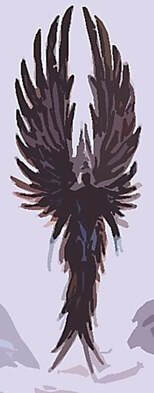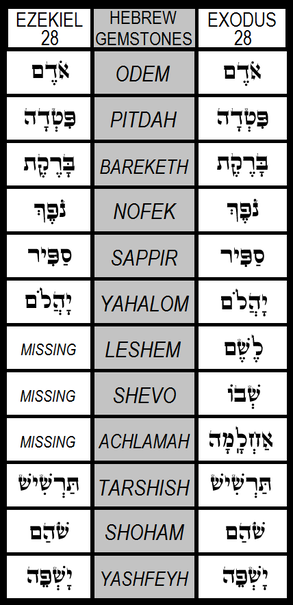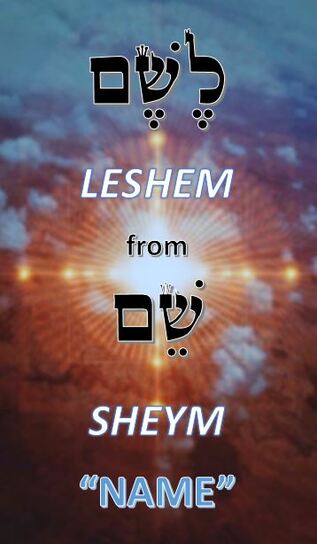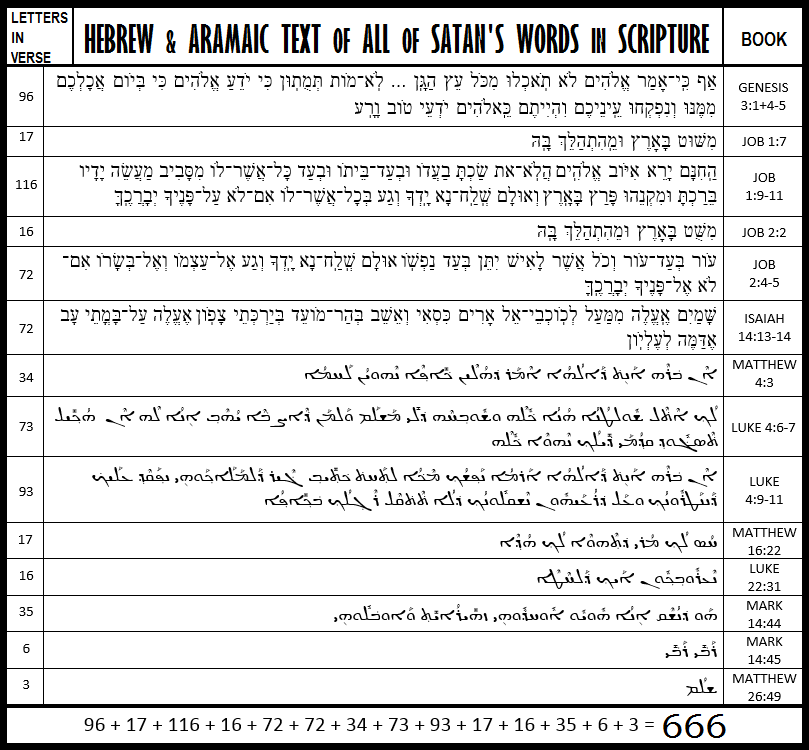THE NAMELESS ONE
by Jeremy Chance Springfield
10/17/2020
You’ve heard him called by many titles.
However, there is one passage in Scripture with a set of details preserving a unique truth about the Enemy that speaks volumes without saying a word.
Ezekiel 28 discusses the character of the King of Tyre, and as it progresses, the details begin to slowly morph into nuances that no longer describe a human heathen king, but the nature of the spiritual entity at work behind the throne—Satan himself. This passage is one whose true meaning has been debated for centuries, but when the subtle aspects of the text are considered with care, it can be strongly asserted that the prophet changes from addressing the pagan king to the spirit who is truly pulling the strings. Understanding this aspect helps us to appreciate the details of the passage and how they ultimately apply to the battle we face that is not against flesh and blood.
Ezekiel 28 discusses the character of the King of Tyre, and as it progresses, the details begin to slowly morph into nuances that no longer describe a human heathen king, but the nature of the spiritual entity at work behind the throne—Satan himself. This passage is one whose true meaning has been debated for centuries, but when the subtle aspects of the text are considered with care, it can be strongly asserted that the prophet changes from addressing the pagan king to the spirit who is truly pulling the strings. Understanding this aspect helps us to appreciate the details of the passage and how they ultimately apply to the battle we face that is not against flesh and blood.
Among those details is a statement describing the opulent angelic nature of the Enemy prior to his act of rebellion against the Holy One. Ezekiel 28:13-14 gives the relevant information.

13 In Eyden, the Garden of Elohim, you were. Every precious stone was your covering: odem, pitdah, yahalom, tarshish, shoham, yashfeyh, sappir, nofek, and bareketh—and the gold workmanship of your timbrels and your pipes was fixed with you on the day you were created.
14 You are the anointed keruv who covers, and I set you [thus]. On the Holy Mountain of Elohim you were. In the midst of fiery stones you walked about.
14 You are the anointed keruv who covers, and I set you [thus]. On the Holy Mountain of Elohim you were. In the midst of fiery stones you walked about.
These two verses highlight the fact that the king of Tyre is no longer being referenced directly, but the power behind his pagan rule: Satan. This can be majorly evidenced by the fact that the description turns to one who was in the Garden of Eden, as well as the grammatical change that occurs in the Hebrew—from a masculine gender of terms to the very odd but specific feminine version of “You” that begins verse 14—ATH—that presents an abrupt change of tone not easily captured in translation, yet startling in the original Hebrew.
I have also translated this passage as literally as possible while leaving the names of the precious gems listed in their original Hebrew terms, as the precise identification of the stones is no longer known.
However, it is the presence of this list that holds the details needed to open up this description into a much deeper truth.
The stones listed here are ones that Scripture has dealt with previously in the Torah. Exodus 28:17-20 list the precious gems that beautify the high priest’s breastplate.
However, it is the presence of this list that holds the details needed to open up this description into a much deeper truth.
The stones listed here are ones that Scripture has dealt with previously in the Torah. Exodus 28:17-20 list the precious gems that beautify the high priest’s breastplate.
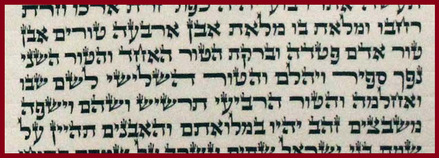
17 And you shall fill it with a fitting of stone: four rows of stone. A row of odem, pitdah, and bareketh—the first row.
18 And the second row: nofek, sappir, and yahalom.
19 And the third row: leshem, shevo, and achlamah.
20 And the fourth row: tarshish, and shoham, and yashfeyh. Their enclosures shall be in settings of gold.
18 And the second row: nofek, sappir, and yahalom.
19 And the third row: leshem, shevo, and achlamah.
20 And the fourth row: tarshish, and shoham, and yashfeyh. Their enclosures shall be in settings of gold.
It quickly becomes apparent that the Hebrew gems adorning the breastplate of the high priest are referred to again when the prophet Ezekiel describes the Edenic angelic nature of Satan.
From this parallel can be gleaned the priestly nature of Satan and the angelic nature of the high priest. This is a connection made also by another prophet in Malachi 2:7.
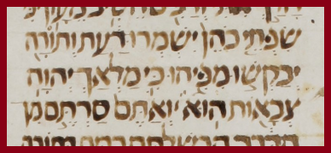
For the lips of the priest shall guard knowledge, and the Torah they should seek from his mouth, for the angel of YHWH of legions is he.
It should therefore come as no surprise to read that Satan in his pre-fallen state was supposed to function in some manner of an intercessory nature just as the Levitical high priest is supposed to minister to the people. This factor also plays into the aspect of the Enemy that is still found to be at work: a religious tone exists in all that he does—albeit a perverse one. His function was to serve a spiritual role, and even though rebellion has tainted him through and through, that original purpose survives in a skewed way: an inclination towards evil in all things spiritual instead of holiness.
It is in this that his steadfast intent on pulling the worship of man away from the Creator can be understood. And in the details of the gemstones lay the truth of his plight. The keen reader will notice that the same stones commanded to be set into the high priest’s breastplate are the same ones mentioned when Ezekiel describes the original angelic nature of Satan--yet with a difference!
When the two lists are compared, it becomes apparent that the list is lacking in the one applied to Satan in Ezekiel 28. The following image shows the two lists and what is missing.
When the two lists are compared, it becomes apparent that the list is lacking in the one applied to Satan in Ezekiel 28. The following image shows the two lists and what is missing.
The three gemstones that are missing in the list applied to Satan are called LESHEM, SHEVO, and ACHLAMAH. Therefore, only nine (9) are present as adorning Satan, while twelve (12) are commanded to be worn by the high priest serving the Holy One.
Let us look at the meaning of these three precious stones according to their Hebrew roots and we will perceive in them a truth concerning the nature of Satan that will help us understand who we oppose and why our ministry before him is one of victory.
The gem referred to as SHEVO has as its root the term SHUV “repent,” so that the version of SHEVO essentially means “He repents.”
Let us look at the meaning of these three precious stones according to their Hebrew roots and we will perceive in them a truth concerning the nature of Satan that will help us understand who we oppose and why our ministry before him is one of victory.
The gem referred to as SHEVO has as its root the term SHUV “repent,” so that the version of SHEVO essentially means “He repents.”
The stone referred to as ACHLAMAH has as its Semitic root the term CHALAM, which is ultimately Aramaic, and means in that tongue “join closely.”
The gemstone LESHEM has as its root the term SHEYM, meaning “name,” and thus essentially means “to the name.”
In the end, the three missing gemstones can be arranged to make the resulting phrase: “He repents, joining closely to the Name.”
These are the three stones which Satan did not possess in his description. Significant revelations about him can be ascertained by his lack of these stones.
The lack of SHEVO explains why Satan cannot repent of his rebellion. He does not possess the spiritual quality of repentance. Man does, and the whole purpose of the high priest is to repent himself and then bring the repentance of the people before the Holy One.
The lack of ACHLAMAH means that Satan remains forever far off from the nature of the Holy One. Subsequently, his nature will reflect the opposite—the other side of holiness is the nature of Satan because he cannot join close to the nature of the Holy One. Man has that ability for spiritual intimacy with the Creator.
The lack of LESHEM means that Satan cannot call upon the Name of the Creator any longer. He has no authority to even utter the Name of the Most High. This puts him in a completely hopeless position. And yet, mankind has the ability to and is commanded to call out to the Creator for all needs.
The lack of SHEVO explains why Satan cannot repent of his rebellion. He does not possess the spiritual quality of repentance. Man does, and the whole purpose of the high priest is to repent himself and then bring the repentance of the people before the Holy One.
The lack of ACHLAMAH means that Satan remains forever far off from the nature of the Holy One. Subsequently, his nature will reflect the opposite—the other side of holiness is the nature of Satan because he cannot join close to the nature of the Holy One. Man has that ability for spiritual intimacy with the Creator.
The lack of LESHEM means that Satan cannot call upon the Name of the Creator any longer. He has no authority to even utter the Name of the Most High. This puts him in a completely hopeless position. And yet, mankind has the ability to and is commanded to call out to the Creator for all needs.
The Enemy’s nature is thus plagued with an inability to repent, to be spiritually in exile from the Holy One, and with no way to call upon the Name. These areas of lack display the weakness of his ministry of condemnation, and how deep that reality runs in him. The truth of this matter can be seen in how Scripture records Satan in the scattered moments where he actually speaks.
I have listed below each and every single instance where the Word records the words of the fallen angel, whether he spoke them outright or was quoted by someone else. I have also included the words of Simon Peter in one instance where the Enemy spoke through him, and the words of Judas during the time he was possessed in order to betray Yeshua.
As a rule, when it came to the places where Satan spoke in the Synoptic Gospels and it was repeated in another Gospel, I used as the baseline the verse which had the most wording regarding what he said, so as not to leave out any potential detail. I also counted the instances where a word was used in one place and was not found in another.
What follows, in their entirety, are the words of Satan in Scripture.
I have listed below each and every single instance where the Word records the words of the fallen angel, whether he spoke them outright or was quoted by someone else. I have also included the words of Simon Peter in one instance where the Enemy spoke through him, and the words of Judas during the time he was possessed in order to betray Yeshua.
As a rule, when it came to the places where Satan spoke in the Synoptic Gospels and it was repeated in another Gospel, I used as the baseline the verse which had the most wording regarding what he said, so as not to leave out any potential detail. I also counted the instances where a word was used in one place and was not found in another.
What follows, in their entirety, are the words of Satan in Scripture.

“…Even so, did Elohim say you shall not eat from every tree of the garden?”
~ Genesis 3:1
~ Genesis 3:1

4 “You will not surely die!
5 For Elohim knows that in the day you eat from it, then your eyes shall be opened, and you shall be as Elohim, knowing good and evil!”
~ Genesis 3:4-5
5 For Elohim knows that in the day you eat from it, then your eyes shall be opened, and you shall be as Elohim, knowing good and evil!”
~ Genesis 3:4-5

“From moving around in the earth, and walking about in it.”
~ Job 1:7
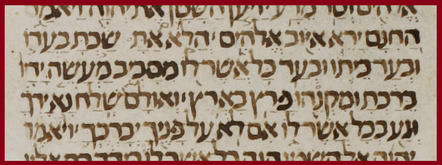
9 “Does Iyov baselessly fear Elohim?
10 Have You not hedged around him and around his house, and around all which is his—all around? The work of his hand You blessed, and his possession has broken forth in the earth!
11 And nevertheless, send forth—I ask—Your hand, and strike on all which is his, [and do you think] even he shall not before Your face bless you [with a curse]?"
~ Job 1:9-11
10 Have You not hedged around him and around his house, and around all which is his—all around? The work of his hand You blessed, and his possession has broken forth in the earth!
11 And nevertheless, send forth—I ask—Your hand, and strike on all which is his, [and do you think] even he shall not before Your face bless you [with a curse]?"
~ Job 1:9-11

“From moving around in the earth and walking about in it.”
~ Job 2:2
~ Job 2:2

4 “Skin in place of skin! And all which is for a man he shall give in place of his soul!
5 And nevertheless, send forth—I ask—Your hand, and strike his bone and his flesh, [and do You think] even he shall not before Your face bless you [with a curse]?”
~ Job 2:4-5
5 And nevertheless, send forth—I ask—Your hand, and strike his bone and his flesh, [and do You think] even he shall not before Your face bless you [with a curse]?”
~ Job 2:4-5
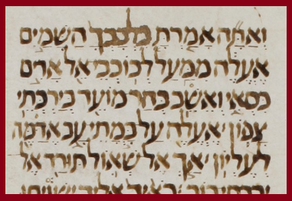
13 “The heavens I shall ascend; I shall exalt over the stars of El my throne! I shall sit on the Mount of Appointed Time, at the sides of the north!
14 I shall ascend over the heights of the cloud; I shall be like the Highest!”
~ Isaiah 14:13-14
14 I shall ascend over the heights of the cloud; I shall be like the Highest!”
~ Isaiah 14:13-14

“If you are the Son of Alaha, say that these stones shall become bread!”
~ Matthew 4:3
~ Matthew 4:3
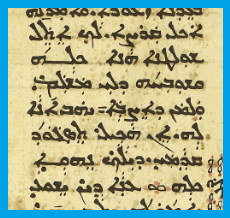
6 “To you I shall give all of this authority, and the glory of it, which is delivered up to me, and to whomever that I desire, I give it to him.
7 If, therefore, you shall worship before me, it shall all be yours!”
~ Luke 4:6-7

9 "If you are the Son of Alaha, cast yourself from here to below,
10 for it is written: 'His angels He shall command concerning you, that they shall keep you,'
11 and 'upon their arms they shall bear you, that you not strike your foot on a stone.'”
~ Luke 4:9-11
10 for it is written: 'His angels He shall command concerning you, that they shall keep you,'
11 and 'upon their arms they shall bear you, that you not strike your foot on a stone.'”
~ Luke 4:9-11
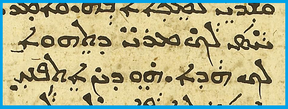
“Forbid it for you, my Master, that it should happen to you!”
~ Matthew 16:22

“[He asked] to sift you as wheat!”
~ Luke 22:31
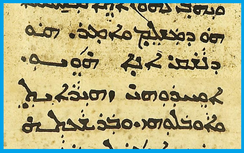
“He whom I kiss is he. Seize him carefully and lead him off.”
~ Mark 14:44

“Rabbi! Rabbi!”
~ Mark 14:45

“Peace!”
~ Matthew 26:49
The reader may well wonder why I have endeavored to show every single instance of Satan’s words in Scripture. The reason bears upon this study in a meaningful way. If the above words are carefully read, it will become apparent that in no place where he is recorded as speaking does Satan ever utter the Divine Name of the Holy One—YHWH—as it is here presented in a substitute form out of the utmost respect. In keeping with the nuanced detail of the three stones which he lacks, he is unable to repent, to draw close, and to call upon the Name, and his own words maintain this spiritual judgment upon him!
Astonishingly, if one counts up the Hebrew and Aramaic letters which comprise every single occurrence in Scripture of what Satan has said, the sum itself tells us all we need to know. The accompanying chart gives each passage listed above in its original language, and tallies the letter count in each passage to arrive at an unbelievable sum of how many letters comprise the words of Satan in Scripture.
Astonishingly, if one counts up the Hebrew and Aramaic letters which comprise every single occurrence in Scripture of what Satan has said, the sum itself tells us all we need to know. The accompanying chart gives each passage listed above in its original language, and tallies the letter count in each passage to arrive at an unbelievable sum of how many letters comprise the words of Satan in Scripture.
The sum total of all that Satan is recorded to have said in the text of Scripture is none other than the number six hundred sixty-six (666)! What an amazing detail that shows the text of Scripture has been preserved in a miraculous fashion! Granted, this only works with the Hebrew verses when the New Testament passages are read in their Aramaic text as preserved in the ancient Peshitta and not the Greek versions, which could be said to give even further credit to the authenticity of that text as recording the original words of the apostles.
Additionally, we also find that in no place in all of the Word is Satan ever given a true name. We see title after title presented in the text, but that is all that is ever offered. He has no name by which we can call him. Religious tradition has set upon him several supposed names, but the inspired text of Scripture itself provides not a single name—only titles of reference. Satan has lost not only the ability to call upon the Holy One, but he has also forfeited any remembrance in the Word of his original name. He has effectively been blotted out from the book of life.
In the only two ways that matter, Satan is truly the nameless one.
Additionally, we also find that in no place in all of the Word is Satan ever given a true name. We see title after title presented in the text, but that is all that is ever offered. He has no name by which we can call him. Religious tradition has set upon him several supposed names, but the inspired text of Scripture itself provides not a single name—only titles of reference. Satan has lost not only the ability to call upon the Holy One, but he has also forfeited any remembrance in the Word of his original name. He has effectively been blotted out from the book of life.
In the only two ways that matter, Satan is truly the nameless one.
In these details we can see the contrast of our own most merciful position as believers.
We can repent.
We can draw close.
We can call upon His Name.
And in turn, we have our names written in the book of life.
We can repent.
We can draw close.
We can call upon His Name.
And in turn, we have our names written in the book of life.
So, although the Enemy we face is shrewd and cunning, and his acts are a perverse ministry of condemnation against our own of reconciliation, in the end we can rejoice not in the authority we possess to make the kingdom of darkness submit before us, but in the astounding future that is offered to us as His people, as Yeshua rightly asserted to His disciples in Luke 10:20.
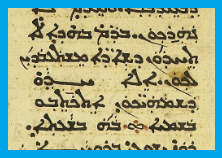
"Nevertheless, in this you must not rejoice: that destroyers are subjugated to you. Rather, you must rejoice that your names are written in the heavens!"
All study contents Copyright Jeremy Chance Springfield, except for graphics and images, which are Copyright their respective creators.
